
Apples
Apples are a versatile and delicious fruit known for their numerous health benefits, particularly in supporting cardiovascular health and managing blood pressure.
Rich in dietary fibre, especially soluble fibre such as pectin, apples help lower cholesterol levels and improve blood vessel function, which can contribute to reduced blood pressure.
They also contain powerful phytochemicals like quercetin, a flavonoid with anti-inflammatory and antihypertensive properties.
Research indicates that regular apple consumption is associated with a decreased risk of hypertension and heart disease.
Incorporating apples into your daily diet—whether eaten fresh, added to oatmeal, or included in salads, can be an easy and tasty way to promote healthy blood pressure levels and overall well-being.

Apricots
Apricots are a sweet, nutrient-dense fruit that can play a valuable role in supporting healthy blood pressure levels.
Packed with essential vitamins and antioxidants, fresh apricots are an excellent source of vitamin C, which helps reduce oxidative stress and improve blood vessel health.
They also contain beta-carotene, a precursor to vitamin A, which promotes immune function and skin health.
Apricots provide about 3.3 grams of dietary fibre per cup, which aids in lowering blood pressure by improving cholesterol levels and promoting healthy blood flow.
Additionally, they supply potassium, a vital mineral that helps regulate fluid balance and relaxes blood vessel walls, further contributing to blood pressure control.
Whether enjoyed fresh, added to salads, or blended into smoothies, apricots are a delicious and nutritious choice for cardiovascular health and overall wellness.

Bell Peppers
Bell peppers, especially the vibrant red, yellow, and orange varieties, are a powerful addition to a blood pressure-friendly diet.
Rich in vitamin C, carotenoids, and antioxidants, they help combat oxidative stress and inflammation, both of which are linked to hypertension.
Red bell peppers, in particular, contain high levels of capsaicin, which may promote better blood vessel function and lower blood pressure.
They also provide a good amount of potassium, a mineral essential for maintaining healthy blood pressure levels by balancing out the effects of sodium.
Incorporating bell peppers into your meals, whether raw in salads, stuffed, roasted, or added to stir-fries, can boost your intake of these beneficial nutrients.
Their vibrant colour and crisp texture make them a delicious and healthful way to support cardiovascular health and manage blood pressure naturally.

Blueberries
Blueberries are a powerhouse fruit renowned for their high antioxidant content and numerous health benefits, especially for heart health and blood pressure regulation.
Rich in anthocyanins, the compounds responsible for their deep blue colour, blueberries help reduce inflammation and oxidative stress, both of which are linked to hypertension.
They are also a good source of vitamin C, vitamin K, and dietary fibre, all of which support vascular health and improve blood flow.
br>Studies have shown that regular consumption of blueberries can help lower systolic and diastolic blood pressure by enhancing the elasticity of blood vessels and reducing arterial stiffness.
Incorporating blueberries into your diet, whether in smoothies, yogurt, oatmeal, or as a snack, provides a delicious way to support healthy blood pressure levels and boost overall cardiovascular health.

Carrots
Carrots are a crunchy, sweet root vegetable packed with essential nutrients that support cardiovascular health and help maintain healthy blood pressure levels.
Rich in beta-carotene, which the body converts into vitamin A, carrots boost immune function and promote healthy skin and vision.
They are also a good source of potassium, a mineral that helps relax blood vessel walls and balance sodium levels, thereby aiding in blood pressure control.
Additionally, carrots contain dietary fibre, which can help improve cholesterol levels and promote healthy blood flow.
Incorporating carrots into your diet, whether raw in salads, steamed, roasted, or juiced, provides a delicious way to support heart health and overall wellness.

Cherries
Cherries are a delicious and nutrient-rich fruit that offer numerous benefits for cardiovascular health and blood pressure management.
Packed with antioxidants such as anthocyanins and quercetin, cherries help combat inflammation and oxidative stress, which are key factors in hypertension.
They are also a good source of potassium, a mineral essential for relaxing blood vessel walls and maintaining healthy blood pressure levels.
Additionally, cherries contain melatonin, which supports better sleep quality, an important aspect of overall heart health. Regular consumption of cherries, whether fresh, dried, or in juices, can contribute to reducing blood pressure and lowering the risk of chronic diseases.
Their natural sweetness makes them a perfect, healthful addition to your diet aimed at promoting a healthy heart.

Dark Chocolate
Dark chocolate, when consumed in moderation, can be a beneficial addition to a heart-healthy diet due to its rich content of flavonoids, particularly epicatechin, which have been shown to improve blood vessel function and lower blood pressure.
High-quality dark chocolate with at least 70% cocoa is a good source of antioxidants that combat oxidative stress and inflammation, key factors in hypertension and cardiovascular disease.
Additionally, dark chocolate contains minerals such as magnesium and potassium, which support healthy blood flow and relaxation of blood vessels.
Enjoying a small piece of dark chocolate as part of a balanced diet can help satisfy sweet cravings while contributing to improved heart health and blood pressure regulation.

Eggs
Eggs are a highly nutritious and versatile food that can support a heart-healthy diet when consumed in moderation.
They are an excellent source of high-quality protein, vitamins such as B12 and D, and minerals like selenium and choline.
While eggs do contain cholesterol, recent research suggests that for most people, moderate egg consumption does not significantly impact blood cholesterol levels or blood pressure.
Instead, eggs provide essential nutrients that help maintain overall cardiovascular health.
Incorporating eggs into your diet, whether boiled, scrambled, or poached, can be a simple way to boost nutritional intake and support your efforts to manage blood pressure and promote heart health.

Flaxseed
Flaxseed is a nutritional powerhouse, renowned for being an excellent source of dietary fibre and omega-3 fatty acids, both of which play a vital role in supporting heart health and managing blood pressure.
The high soluble fibre content helps reduce cholesterol levels, improve blood vessel elasticity, and promote healthy digestion.
Additionally, flaxseeds are rich in alpha-linolenic acid (ALA), a plant-based omega-3 fatty acid that has anti-inflammatory properties and can help lower blood pressure and reduce the risk of cardiovascular disease.
Incorporating ground flaxseed into your diet, by adding it to smoothies, oatmeal, or baked goods, can be an easy and effective way to boost fibre and omega-3 intake, supporting overall heart health and blood pressure regulation.

Garlic
A popular culinary herb from the Allium family, known for its strong aroma and health-promoting properties.
It contains sulfur compounds like allicin, along with vitamins and minerals.
Supports heart health by lowering cholesterol and preventing blood clots Boosts immune function.
Reduces inflammation and oxidative stress.
Aids in detoxification.
Garlic helps lower blood pressure by promoting vasodilation through nitric oxide and hydrogen sulphide production, improving blood vessel flexibility, and reducing blood clot formation.
Regular intake can aid in managing hypertension.
Usage Tips: - Consume fresh garlic or supplements regularly.
Consult a healthcare professional before use, especially if on blood-thinning medications.

Kale
Kale is a nutrient-dense superfood highly recommended for anyone aiming to lower or manage high blood pressure.
Rich in quercetin, a powerful antioxidant known for its ability to relax blood vessels and reduce blood pressure.
Kale also provides high levels of beta-carotene, which supports immune health and overall vitality.
Additionally, kale is an excellent source of vitamin C, which aids in reducing inflammation and improving blood vessel function.
Incorporating kale into your diet, whether in salads, smoothies, or sautéed dishes, can be a flavourful way to harness its blood pressure-lowering benefits and enhance your overall cardiovascular health.
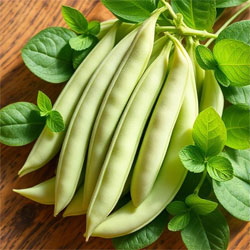
Limba Beans
Lima beans are a nutritional wonder food.
Especially beneficial for those striving to control their blood pressure.
Packed with potassium, magnesium, and dietary fibre, lima beans help relax blood vessel walls, improve blood flow, and lower overall blood pressure levels.
Their high fibre content also aids in reducing cholesterol, further supporting heart health.
Incorporating lima beans into your diet, whether in soups, stews, or salads, provides a delicious and wholesome way to promote healthy blood pressure and enhance cardiovascular wellness.
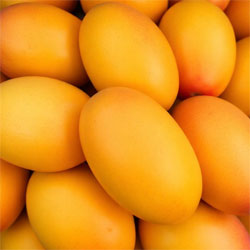
Mangoes
Mangoes are a delicious tropical fruit that offer numerous health benefits, especially for those looking to lower their blood pressure.
Rich in dietary fibre, mangoes help improve digestion and support healthy blood vessel function, while their high beta-carotene content, converted into vitamin A in the body, has been associated with reduced blood pressure levels.
Additionally, mangoes provide essential vitamins and antioxidants that combat oxidative stress and promote overall cardiovascular health.
Enjoy mangoes fresh, in smoothies, or as a topping to support your blood pressure management and enhance your diet with their sweet, vibrant flavour.

Onions
Onions are a flavourful and versatile vegetable that serve as a great source of quercetin.
A potent antioxidant known for its ability to help lower blood pressure and reduce inflammation.
Quercetin supports healthy blood vessel function and improves blood flow.
Making onions a valuable addition to a heart-healthy diet.
Whether raw in salads, sautéed in dishes, or added to soups, onions not only enhance flavour but also contribute to cardiovascular wellness and blood pressure regulation.
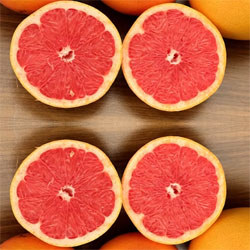
Pink Grapefruit
Pink grapefruit is a refreshing and tangy citrus fruit that is a good source of lycopene, a powerful antioxidant linked to heart health and the reduction of blood pressure.
Lycopene helps combat oxidative stress and supports the health of blood vessels, contributing to improved circulation and cardiovascular function.
Enjoying pink grapefruit as part of a balanced diet, whether on its own, in fruit salads, or as juice, can provide a delicious way to boost your intake of heart-healthy nutrients and promote overall blood pressure management.
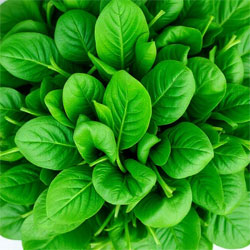
Spinach
Spinach is a leafy green superfood that can be a key part of your blood pressure-lowering routine due to its high content of potassium, magnesium, and nitrates, which work together to relax blood vessels and improve blood flow.
Rich in antioxidants and fibre, spinach supports overall cardiovascular health and helps maintain healthy blood pressure levels.
Incorporate spinach into salads, smoothies, or sautés.
Enjoy its nutritional benefits and support your heart health in a delicious and easy way.

Strawberries
Strawberries are a delicious and nutrient-rich fruit packed with antioxidants, vitamin C, and polyphenols that support heart health and help regulate blood pressure.
Their high levels of anthocyanins have been linked to improved blood vessel function and reduced inflammation.
Incorporating strawberries into your diet, whether fresh, in smoothies, or as a topping, can be a sweet and effective way to boost cardiovascular health and maintain healthy blood pressure levels.

Sweet Potatoes
Sweet potatoes are a nutritious root vegetable rich in potassium, fibre, and antioxidants that support healthy blood pressure levels.
Their high potassium content helps relax blood vessel walls and balance sodium levels, promoting better circulation and heart health.
Additionally, sweet potatoes' fibre content aids in reducing cholesterol, further benefiting cardiovascular wellness.
Incorporate sweet potatoes into your meals, roasted, mashed, or baked, for a tasty and heart-healthy addition to your diet.
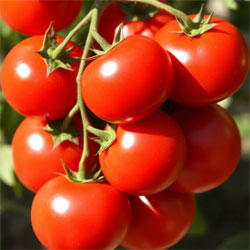
Tomatoes
Tomatoes are a vital component of a heart-healthy diet, often considered the key to healthier blood pressure due to their rich content of lycopene, potassium, and antioxidants.
Lycopene helps reduce oxidative stress and supports the health of blood vessels, while potassium aids in balancing sodium levels and relaxing artery walls.
Incorporating tomatoes into your meals, whether fresh in salads, cooked in sauces, or as part of stews, can significantly contribute to lowering blood pressure and promoting overall cardiovascular wellness.

Watermelon
Watermelon is a hydrating and refreshing fruit packed with lycopene, citrulline, and antioxidants that can help lower blood pressure and improve cardiovascular health.
Citrulline in watermelon converts to arginine, which promotes the production of nitric oxide, a compound that relaxes blood vessels and enhances blood flow.
Its high water content not only keeps you hydrated but also supports healthy circulation.
Enjoy watermelon sliced, blended into smoothies, or as a juicy snack to naturally boost your blood pressure management and support overall heart health.
Precautions:
The information provided is for general educational purposes only.
If you have high blood pressure or any other health condition, please consult your healthcare provider or a registered nutritionist before making any changes to your diet or taking supplements. This ensures that all fruits, vegetables, or supplements are appropriate and safe for your individual health needs.




















